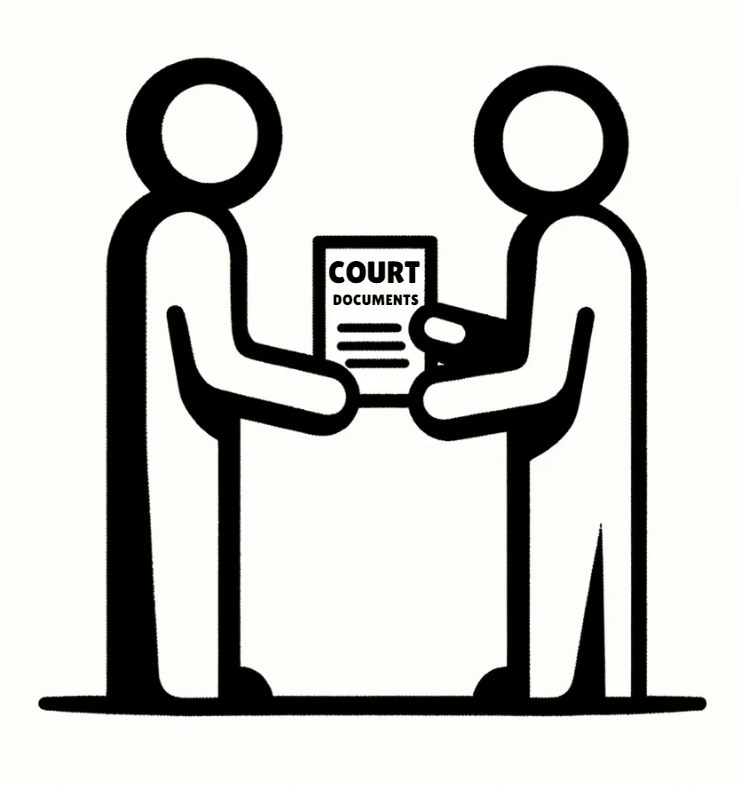
Serving Court Documents
Which rule governs “time” for documents? What does it cover?
“Rule 3: Time” governs the amount of time you have to serve and file your documents. If documents are submitted outside of the time frame of this rule, they may not be accepted.
- Calculating number of days: When counting the number of days between two events, the first day is the day after the first event, and the last day is the day of the second event.
If the time is less than 7 days, how is time calculated?
Factors which may impact deadlines:
- Short periods less than 7 days: If there is a period of less than 7 days for something to be done, Saturdays, Sundays, and other days when all court offices are closed do not count as part of the period.
- Time of day: Sometimes, you have to file your documents by a specific time on a specific day (for example, 2pm.) Double check what is required for your type of document. Additionally, it is generally a good idea to file documents within general business hours (8:30am-5pm.)
What is service? What rule governs service?
Service is the act of serving documents, which means giving a copy of the documents in your family case to the other party. “Rule 6: Service of Documents” governs service.
What are the 2 different types of service?
The two types of service are
- Regular service.
- Special service.
Special service is required for certain types of documents. You can always choose to use special service instead of regular, even if it is not required.
What is “regular service”?
Regular service is the “default” way to serve, and can be performed for the majority of documents. It refers to sending court documents directly to the other party (or their lawyer.) There are different ways to perform regular service, and some ways have special conditions.
Regular service can be done by:
- Email.
- Mail.
-
- Courier.
- In-person document exchange. This means leaving the documents at a special document exchange point (usually a “cubby-hole” in a courthouse belonging to the other party’s lawyer.)
- Fax (see special conditions below.)
- Electronic document exchange (see special conditions below.)
To perform regular service using fax, you must meet the following conditions:
- Documents must not be more than 20 pages (unless the other party explicitly consents, or the court has ordered to allow it.)
- You are not serving documents which contain a trial record, appeal record, factum, or book of authorities (unless the other party explicitly consents.)
To perform regular service using an electronic document exchange service, you must meet either of the following conditions:
- The other party has explicitly agreed to be served this way, or
- It has been ordered by a judge.
Important! If you serve electronically (by fax, email, or an electronic document exchange) the email, record of service, or first page of the fax must include:
- The date and time the service took place.
- The sender’s name, phone number and fax number or email address.
- The name of the party you are serving (or their lawyer.)
- The total number of pages you are serving.
- A title or a description of the document.
- Contact information (name and telephone number) of who to contact in case of technical difficulty in receiving the documents.
Not all documents can be served via regular service – see below.
What is “special service”?
Special service is a specific type of way to serve someone, usually involving giving the documents to them in person. In certain cases, special service is the required way to serve someone. For example:
- If you are starting a family case.
- If what you are doing could cause the other party to go to jail.
Double check whether special service is required for the court documents you are serving.
You can perform special service by:
- Personally giving a copy to the party being served.
- Serving the other party’s lawyer, who must then confirm that they received the service by writing on the document being served.
- Sending a copy via mail along with Form 6: Acknowledgment of Service, which the party being served must sign and mail back to you.
- Personally giving a copy to an adult who lives at the same address, and also mailing a second copy to the same address on the same day or the next day.
You can choose to use special service, even if it is not required.
Which documents require special service, but you cannot deliver yourself?
The following documents require special service, but cannot be delivered by you:
- Application (Form 8 or Form 8A).
- Motion to Change (Form 15), and affidavit (Form 14A).
- Those which could lead to the imprisonment of the other party, such as a:
- Summons to Witness (Form 23).
- Notice of Contempt Motion (Form 31).
- Notice of Motion (Form 14) or Notice of Default Hearing (Form 30) if they include a possibility of imprisonment.
Who can serve the above documents?
If your documents contain any of the above forms, you need to find someone who can serve the other party on your behalf. This can be done by:
- Any adult over the age of 18 (such as a friend or family member.)
- A professional process server.
What is personal service?
Personal service is a type of special service and means giving the other party the documents in-person. This is done by hand-delivering a copy to the other party (or to their lawyer.)
What is the difference between serving and filing a document?
Serving means giving a copy of your court documents to the other party, whereas filing means giving a copy of your court documents to staff at the court.
How old do you have to be to serve?
You must be 18 years old or older to serve.
Can you serve on a weekend?
You can serve on a weekend, but remember that when counting time, weekends are not counted for periods less than 7 days (short periods.) For example, if you have 5 days to serve the other party, all 5 days must be on days that courts are normally open.
Can you serve at night?
You can serve at night, but if you serve the other party after 4pm, it is counted as if you had served them the next day instead. This applies to all types of service, including email and fax sent after 4pm.
How do you prove to the court that the documents were served to the opposing party?
In addition to serving the other party, you need to prove to the court that the service happened. This is done by filling out Form 6B: Affidavit of Service. You must file this form at the court office.
The sequence of events for filing this form are as follows:
- Fill out the form, noting when, where, and how the documents were served.
- Sign the form in front of a commissioner for taking affidavits.
- File the form with the court, along with the original copies of the documents you served.
Make sure to file the form before the applicable deadline.
